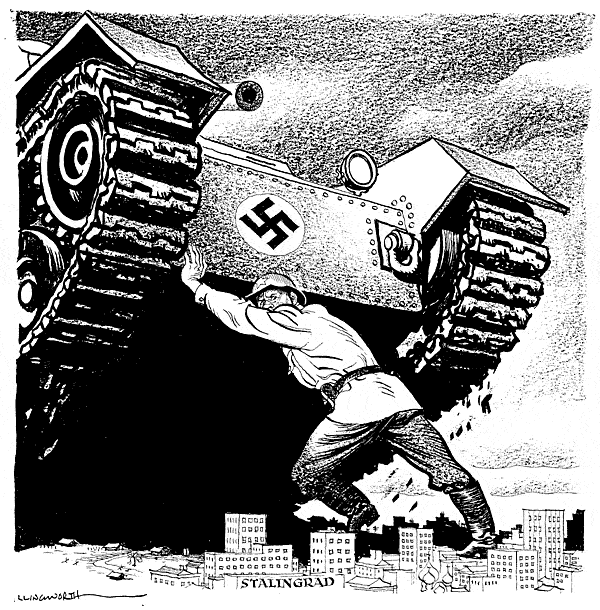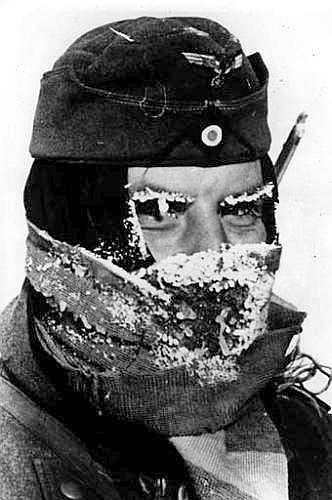Battle for Moscow.

Many think that Stalingrad was the turning point of the Second World War. But the moment in the war that began the decline of Nazi Germany was that one winter day in Russia in 1941 when Josef Stalin paced the platform of Moscow station for some time and then did not climb aboard a train that would take him 600 miles east. Moscow station 
The battle for Moscow—the biggest, bloodiest clash in human history—helped turn the tide against Hitler. But the Soviet leader came closer than most realize to defeat
By mid-October 1941, most of Moscow’s residents were convinced that their city was about to be overrun by the Germans. The NKVD, Narodnyi Komissariat Vnutrennikh Del or People’s Commissariat for Internal Affairs  as the Soviet secret police was then called, had prepared the first of what promised to be a series of pamphlets. “Comrades! We left Moscow due to the continuous attacks of the Germans,” it declared. “But it’s not the right time for us to weep.” The “Underground Party Committee” that signed the statement vowed that Moscow would be liberated. Since the city held out in the end, this admission of defeat was ultimately buried in the NKVD’s classified files rather than distributed. In fact, much of the story of how close Moscow came to falling—a defeat that would likely have transformed the course of the war—has been obscured by decades of deliberately distorted history. Now it’s a story that can be told.
as the Soviet secret police was then called, had prepared the first of what promised to be a series of pamphlets. “Comrades! We left Moscow due to the continuous attacks of the Germans,” it declared. “But it’s not the right time for us to weep.” The “Underground Party Committee” that signed the statement vowed that Moscow would be liberated. Since the city held out in the end, this admission of defeat was ultimately buried in the NKVD’s classified files rather than distributed. In fact, much of the story of how close Moscow came to falling—a defeat that would likely have transformed the course of the war—has been obscured by decades of deliberately distorted history. Now it’s a story that can be told.

The battle for Moscow, which officially lasted from Sept. 30, 1941, to April 20, 1942, pitted two gargantuan armies against each other in what was the greatest clash of arms in human history. Seven million men were involved in some stage of this struggle—twice the number who would later fight at Stalingrad, which most people erroneously believe was the bloodiest battle of World War II. The losses were more than twice that of Stalingrad; during the battle for Moscow, 2.5 million were killed, missing, taken prisoner or severely wounded, with 1.9 million of those losses on the Soviet side.
For the first time a Adolf Hitler blitzkrieg was stopped, shattering his dream of a swift victory over the Soviet Union. The defeat was also the first signal that Germany would lose the war. As Fabian von Schlabrendorff, a German officer who later joined the conspiracy against Hitler, explained, it destroyed “the myth of the invincibility of the German soldier.” And yet the battle for Moscow is now largely forgotten.

THE GERMANS WERE NOT READY FOR THE RUSSIAN WINTER…..
Winter had arrived in full force, with snow, bitter winds, and temperatures dropping below minus twenty degrees centigrade. German tank engines were frozen solid. In the front line, the exhausted infantrymen dug bunkers to shelter from the cold as much as from enemy bombardment. The ground had started to freeze so hard that they needed to light big fires on it first, before attempting to dig. Headquarters staffs and rear echelons occupied peasant houses, expelling Russian civilians into the snow.
Hitler’s refusal to contemplate a winter campaign meant that his soldiers suffered terribly  . ‘Many of the men are going about with their feet wrapped in paper, and there is a great dearth of gloves,’ wrote the commander of a panzer corps to General Friedrich von Paulus. Except for their coal-scuttle helmets, many German soldiers were by now hardly recognizable as members of the Wehrmacht. Their own close fitting, steel-shod jackboots simply hastened the process of frostbite, so they had resorted to stealing the clothes and boots of prisoners of war and civilians.
. ‘Many of the men are going about with their feet wrapped in paper, and there is a great dearth of gloves,’ wrote the commander of a panzer corps to General Friedrich von Paulus. Except for their coal-scuttle helmets, many German soldiers were by now hardly recognizable as members of the Wehrmacht. Their own close fitting, steel-shod jackboots simply hastened the process of frostbite, so they had resorted to stealing the clothes and boots of prisoners of war and civilians.











Leave a Reply